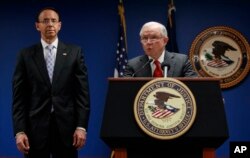Two House committees are postponing a closed-door interview with Deputy Attorney General Rod Rosenstein that was expected to delve into reports that he discussed secretly recording President Donald Trump.
Rosenstein was scheduled on Wednesday to meet with the top lawmakers on the House Judiciary and Oversight and Government Reform panels. The meeting had been scheduled after weeks of negotiations and after speculation last month that Rosenstein would be fired or would resign.
In September, The New York Times reported that Rosenstein had discussed secretly recording the president in 2017 to expose chaos at the White House. The report said he also discussed invoking constitutional provisions to remove Trump from office.
House Judiciary Chairman Bob Goodlatte of Virginia and House Oversight Chairman Trey Gowdy of South Carolina said in a statement released Tuesday evening that their committees "are unable to ask all questions of Deputy Attorney General Rod Rosenstein within the time allotted for tomorrow's transcribed interview,'' so it would be postponed. They did not say how much time was given or why they couldn't fit all of their questions in.
"Mr. Rosenstein has indicated his willingness to testify before the Judiciary and Oversight Committees in the coming weeks in either a transcribed interview or a public setting,'' Goodlatte and Gowdy said. "We appreciate his willingness to appear and will announce further details once it has been rescheduled.''
Under terms laid out by the two committees last week, only the committee chairmen and the two top Democrats on the committees would be in the room, and the interview would be transcribed and eventually released. Members of the conservative House Freedom Caucus had originally pushed for Rosenstein to appear, but were not included in the interview.
North Carolina Rep. Mark Meadows, chairman of the Freedom Caucus and a member of the oversight panel, blamed his exclusion from the meeting on Rosenstein, tweeting on Friday that Rosenstein wanted a private, classified interview with "multiple members'' excluded.
"There should be NO double standard. Show up and tell the truth under the same conditions as everyone else,'' Meadows said on Twitter. Meadows, who is close to the president, has also called on Rosenstein to resign.
Rosenstein went to the White House days after The New York Times report, expecting to be fired, but his job was spared. He later flew with Trump on Air Force One to an international police chiefs' conference in Florida. The president declared his job safe, saying he was "not making any changes.''
"We just had a very nice talk,'' Trump told reporters. "We actually get along.''
Trump and Rosenstein have had an up-and-down relationship, though the deputy has been spared the brunt of the anger directed at his boss, Attorney General Jeff Sessions. Trump's relationship with Sessions deteriorated after the attorney general recused himself from the Russia investigation.
Goodlatte said last month that "there are many questions we have for Mr. Rosenstein, including questions about allegations made against him in a recent news article. We need to get to the bottom of these very serious claims.''
Democrats have called the meeting with Rosenstein part of a Republican effort to undermine special counsel Robert Mueller's investigation into possible coordination between Russia and the Trump campaign during the 2016 presidential election. Because of Sessions' recusal, Rosenstein appointed Mueller as special counsel and oversees that investigation.





